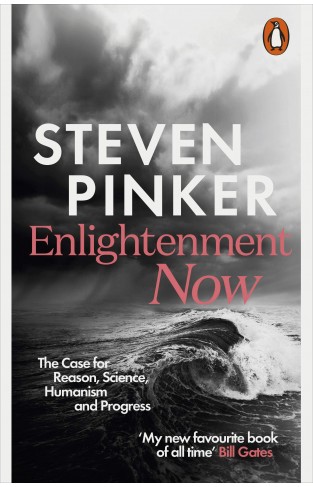Enlightenment Now: The Case for Reason, Science, Humanism, and Progress
By: Steven Pinker
-
Rs 3,415.50
- Rs 3,795.00
- 10%
You save Rs 379.50.
Due to constant currency fluctuation, prices are subject to change with or without notice.
Is modernity really failing? Or have we failed to appreciate progress and the ideals that make it possible?
If you follow the headlines, the world in the 21st century appears to be sinking into chaos, hatred, and irrationality. Yet Steven Pinker shows that this is an illusion - a symptom of historical amnesia and statistical fallacies. If you follow the trendlines rather than the headlines, you discover that our lives have become longer, healthier, safer, happier, more peaceful, more stimulating and more prosperous - not just in the West, but worldwide. Such progress is no accident: it's the gift of a coherent and inspiring value system that many of us embrace without even realizing it. These are the values of the Enlightenment: of reason, science, humanism and progress.
The challenges we face today are formidable, including inequality, climate change, Artificial Intelligence and nuclear weapons. But the way to deal with them is not to sink into despair or try to lurch back to a mythical idyllic past; it's to treat them as problems we can solve, as we have solved other problems in the past. In making the case for an Enlightenment newly recharged for the 21st century, Pinker shows how we can use our faculties of reason and sympathy to solve the problems that inevitably come with being products of evolution in an indifferent universe. We will never have a perfect world, but - defying the chorus of fatalism and reaction - we can continue to make it a better one.
Is modernity really failing? Or have we failed to appreciate progress and the ideals that make it possible?
If you follow the headlines, the world in the 21st century appears to be sinking into chaos, hatred, and irrationality. Yet Steven Pinker shows that this is an illusion - a symptom of historical amnesia and statistical fallacies. If you follow the trendlines rather than the headlines, you discover that our lives have become longer, healthier, safer, happier, more peaceful, more stimulating and more prosperous - not just in the West, but worldwide. Such progress is no accident: it's the gift of a coherent and inspiring value system that many of us embrace without even realizing it. These are the values of the Enlightenment: of reason, science, humanism and progress.
The challenges we face today are formidable, including inequality, climate change, Artificial Intelligence and nuclear weapons. But the way to deal with them is not to sink into despair or try to lurch back to a mythical idyllic past; it's to treat them as problems we can solve, as we have solved other problems in the past. In making the case for an Enlightenment newly recharged for the 21st century, Pinker shows how we can use our faculties of reason and sympathy to solve the problems that inevitably come with being products of evolution in an indifferent universe. We will never have a perfect world, but - defying the chorus of fatalism and reaction - we can continue to make it a better one.
The Better Angels of Our Nature A History of Violence and Humanity
By: Steven Pinker
Rs 3,596.00 Rs 4,495.00 Ex Tax :Rs 3,596.00
Enlightenment Now: The Case for Reason, Science, Humanism, and Progress
By: Steven Pinker
Rs 3,415.50 Rs 3,795.00 Ex Tax :Rs 3,415.50
Rationality : What It Is, Why It Seems Scarce, Why It Matters
By: Steven Pinker
Rs 2,796.00 Rs 3,495.00 Ex Tax :Rs 2,796.00
The Blank Slate - The Modern Denial of Human Nature
By: Steven Pinker
Rs 2,965.50 Rs 3,295.00 Ex Tax :Rs 2,965.50
The Stuff of Thought - Language as a Window Into Human Nature
By: Steven Pinker
Rs 2,965.50 Rs 3,295.00 Ex Tax :Rs 2,965.50
Zubin Mehta: A Musical Journey (An Authorized Biography)
By: VOID - Bakhtiar K. Dadabhoy
Rs 630.00 Rs 1,050.00 Ex Tax :Rs 630.00
Myths Illusions and Peace: Finding a New Direction for America in the Middle East
By: Dennis Ross
Rs 985.50 Rs 1,095.00 Ex Tax :Rs 985.50
The Origins of Political Order From Prehuman Times to the French RevolutioN
By: Francis Fukuyama
Rs 3,505.50 Rs 3,895.00 Ex Tax :Rs 3,505.50
Manning Up: How the Rise of Women Has Turned Men into Boys
By: Kay Hymowitz
Rs 796.00 Rs 995.00 Ex Tax :Rs 796.00
The Obama Syndrome: Surrender At Home War Abroad
By: Tariq Ali
Rs 1,165.50 Rs 1,295.00 Ex Tax :Rs 1,165.50
The Quest For Meaning: Developing A Philosophy Of Pluralism
By: Tariq Ramadan
Rs 1,255.50 Rs 1,395.00 Ex Tax :Rs 1,255.50
No recently viewed books available at the moment.
Zubin Mehta: A Musical Journey (An Authorized Biography)
By: VOID - Bakhtiar K. Dadabhoy
Rs 630.00 Rs 1,050.00 Ex Tax :Rs 630.00
The Better Angels of Our Nature A History of Violence and Humanity
By: Steven Pinker
Rs 3,596.00 Rs 4,495.00 Ex Tax :Rs 3,596.00
Enlightenment Now: The Case for Reason, Science, Humanism, and Progress
By: Steven Pinker
Rs 3,415.50 Rs 3,795.00 Ex Tax :Rs 3,415.50
Rationality : What It Is, Why It Seems Scarce, Why It Matters
By: Steven Pinker
Rs 2,796.00 Rs 3,495.00 Ex Tax :Rs 2,796.00
The Blank Slate - The Modern Denial of Human Nature
By: Steven Pinker
Rs 2,965.50 Rs 3,295.00 Ex Tax :Rs 2,965.50
The Stuff of Thought - Language as a Window Into Human Nature
By: Steven Pinker
Rs 2,965.50 Rs 3,295.00 Ex Tax :Rs 2,965.50



















-120x187.jpg?q6)









-120x187.jpg?q6)





